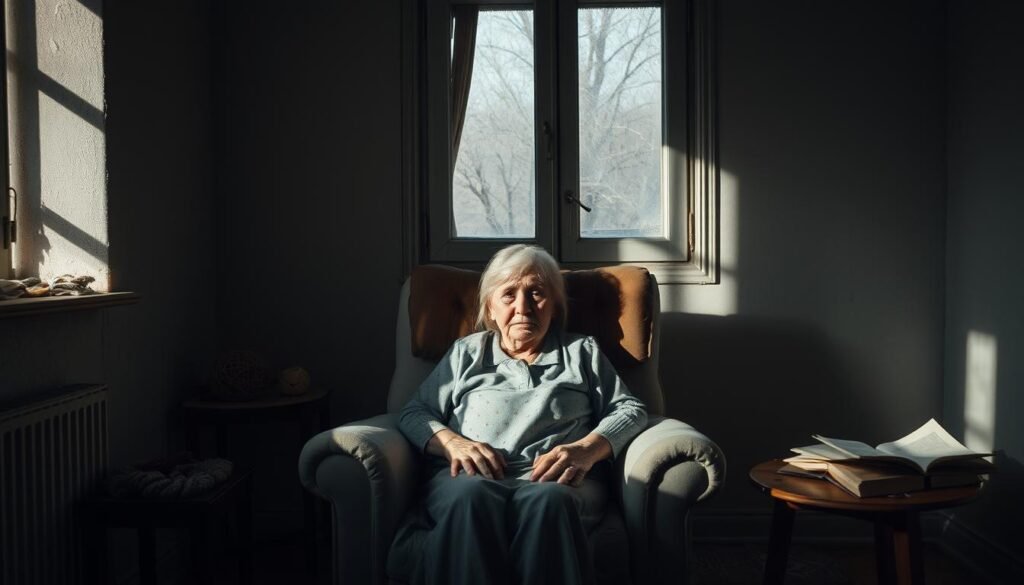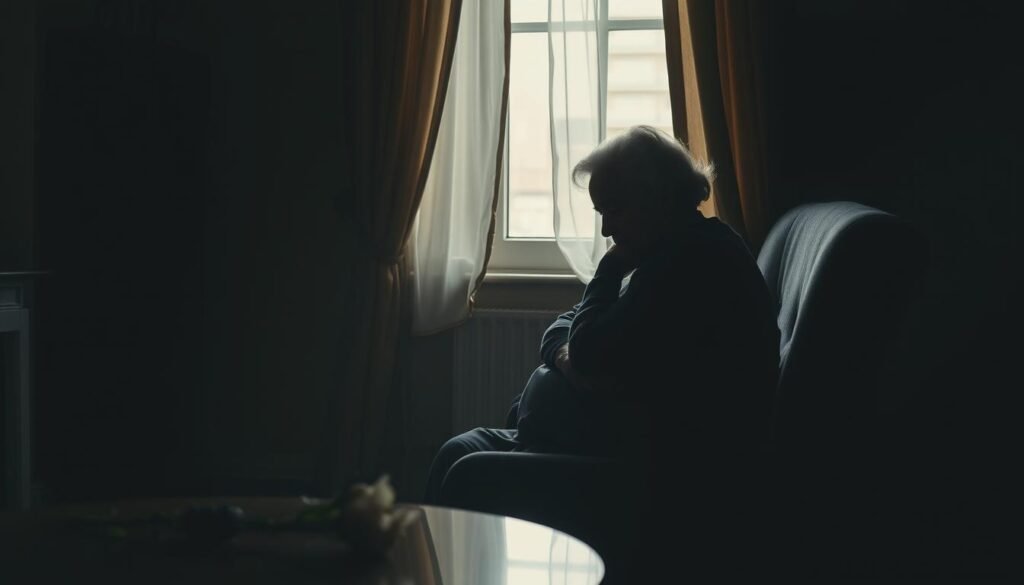In 2010, WebMD’s Year in Health survey showed fatigue as a top concern for women. This problem becomes more common as women get older. They deal with many psychological issues that make them tired. These include emotional stress, health issues, and choices in how they live. It’s important to know about these causes. This is because fatigue might show bigger mental health problems. The National Institute on Aging has mentioned this too.
Stress from things like depression, grief, and caring for others affects older women a lot. These can make their lives harder. We will explore the psychological reasons for their fatigue. This information can help in handling it better and enhancing mental health.
Key Takeaways
- Fatigue ranks among the top health concerns for women, especially as they age.
- Identifying psychological triggers is crucial for managing fatigue in older females.
- Emotional stressors, such as depression and caregiver burden, play significant roles in fatigue levels.
- Recognizing the symptom of fatigue can help identify underlying mental health issues.
- Improving mental health can lead to a better quality of life for older adults.
Understanding Fatigue in Older Adults
Fatigue in older adults can lower their quality of life. It may signal health problems. Factors like medical conditions, life events, and emotions play a role. Recognizing fatigue is crucial because it can predict mortality.
Older people might deal with musculoskeletal weakness. This makes daily activities harder and leads to tiredness. Fatigue in seniors comes from different sources:
- Mental and emotional issues
- Musculoskeletal weakness
- Chronic diseases, such as infections and cancer
- Depression and anemia
- Sleep disorders
Treatments can make seniors feel tired. Medications and procedures like chemotherapy are examples. But exercise can help boost energy, so it’s key for seniors to find suitable activities.
Being socially active helps fight fatigue. Joining in community activities can improve mental health. It lessens feelings of isolation which can cause tiredness. If fatigue doesn’t go away, seeing a doctor is important. They can check for serious illnesses.
Many older Americans, between 40% and 74%, say they feel tired. At hospital admission, 77% of those over 70 mention fatigue. It’s a sign of aging and frailty, especially with chronic diseases.
Research from 2013 to 2018 has focused on fatigue in seniors with chronic conditions. These studies highlight the importance of finding common risk factors. Ways to handle fatigue include:
- Physical activity
- Rest
- Maintaining normal hemoglobin levels
Sometimes lifestyle choices cause tiredness. Staying up late and consuming caffeine or alcohol affect sleep. A regular sleep schedule is essential for restfulness. Avoid long naps late in the day to prevent sleep troubles.
If you’re always tired for weeks, get in touch with a doctor. They may suggest treatments, therapy, healthy eating, and exercise.
The Impact of Emotional Exhaustion
Emotional exhaustion greatly affects the wellbeing of older women. It shows up as various signs of fatigue. Spotting these signs is key to understanding the hidden struggles causing tiredness. It can come from stress or too many demands. It’s crucial to deal with these issues to feel better overall.
Identifying Signs of Emotional Exhaustion
Finding signs of emotional exhaustion is key for older women. Some main indicators include:
- Prolonged feeling of tiredness
- Lack of motivation or excitement
- Irritability and mood swings
- Hard time focusing or deciding
- Problems sleeping or insomnia
Seeing these signs means it’s time to seek help. Getting help can lead to positive changes and stronger emotional health. It’s crucial for older women to notice these signs early. This can prevent more serious health issues. Doing things like mindfulness practices or seeing a therapist can help a lot.
Consequences on Daily Life
Emotional exhaustion deeply impacts daily life. Simple tasks may become hard due to constant tiredness. Being socially active gets harder, causing more solitude and emotional drain.
This issue doesn’t just affect the person. It hinders engaging in loved hobbies or activities. Keeping up with relationships and daily tasks gets tough. So, dealing with emotional exhaustion is important for health and a better life overall.
Psychological Causes of Fatigue in Older Females
Fatigue in older women often comes from psychological causes that affect their lives deeply. Feelings of depression, anxiety, and grief are big factors. They hurt mental health and lower energy levels. These issues can lead to a cycle where emotional problems make fatigue worse. This impacts the ability to do daily tasks and enjoy life.
Research shows about 31% of people over 51 feel fatigued. This shows how common fatigue is among older adults. Emotional issues like depression can make fatigue from chronic conditions worse. Women get chronic fatigue syndrome more than men, with a 4:1 ratio. This highlights a big gender gap in fatigue experiences.
Anxiety can cause short-term fatigue from acute stress. Long-term stress can cause ongoing fatigue. It’s crucial for older women to take care of their mental health. Spotting signs of emotional exhaustion early leads to finding help and coping strategies. Exercise can help lower fatigue. The aim is to manage energy better and enjoy a healthier life.
Knowing the psychological causes of fatigue helps in making good management plans. When looking at fatigue, doctors should check both emotional and physical factors. This can lead to personalized care. It helps older women deal with fatigue better and improve their life quality.
| Factor | Impact on Fatigue | Management Strategies |
|---|---|---|
| Depression | Increases feelings of fatigue | Cognitive Behavioral Therapy, Medication |
| Anxiety | Causes acute stress leading to fatigue | Relaxation Techniques, Mindfulness |
| Grief | Affects emotional well-being and energy | Support Groups, Counseling |
| Chronic Stress | Linked to persistent fatigue | Stress Management Programs, Physical Activity |
| Physical Inactivity | Potentially exacerbates fatigue | Aim for 150 minutes of activity per week |
Role of Depression in Fatigue
It’s key to understand depression’s part in causing fatigue, especially in the elderly. Depression can show itself in many ways that affect someone physically. Signs like always feeling sad, eating less or more, and not caring about fun activities are important.
These signs can mix with getting older. This mix often leads to more tiredness. This tiredness might get ignored or wrongly labeled as something else.
Symptoms of Depression
Depression in older people might look like extreme tiredness. It’s important to notice these warning signs:
- Persistently low mood that affects daily functioning
- Changes in appetite, leading to weight fluctuations
- Loss of interest in previously enjoyable activities
- Feelings of hopelessness or worthlessness
- Increased irritability or anxiety
Connection to Fatigue Levels
The link between depression and feeling more tired in the elderly is strong. Studies show they often go hand in hand. Spotting this early can be crucial.
Getting the right help, like medicine, can make a big difference. It can help with both the sadness and the tiredness.

| Symptoms | Impact on Fatigue |
|---|---|
| Persistently low mood | Increases feelings of tiredness |
| Change in appetite | Leads to energy level fluctuations |
| Loss of interest in activities | Reduces motivation and energy |
| Feelings of hopelessness | Contributes to overall lethargy |
| Increased irritability | Can exacerbate fatigue levels |
The Influence of Anxiety on Energy Levels
Anxiety greatly impacts energy in older women. It causes emotional and physical tiredness. Because of this, it affects their daily life and how much they enjoy activities.
Studies reveal women feel more tired than men. This is from data by the Centers for Disease Control and Prevention. Anxiety disorders like generalized anxiety disorder and panic attacks make this worse. They also can lead to chronic fatigue syndrome, which rest cannot fix.
Anxiety and not sleeping well are linked. A study in 2019 found those with insomnia had a much higher chance of having anxiety. This is especially true for shift workers and those on night shifts. Their irregular sleep increases their anxiety risk. In the long run, this might harm their memory, mood, and immune system.
What we eat also plays a role in anxiety. Foods high in fat and sugar can raise anxiety levels. It shows how diet affects our mental health. Changing what we eat and reducing stress can help. Activities like yoga or meditation are good too.
It’s vital to understand how anxiety and energy are connected. Treatments may include therapy, changing habits, and supplements. Websites offer more info and tips. For instance, this guide on anxiety in older adults. For help with adrenal health, see natural remedies for adrenal fatigue. Exploring these can help older women dealing with anxiety-related tiredness.
Effects of Stress on Older Women
Stress is a big problem for aging females. They face many stressors every day that affect their well-being. Health issues, money worries, and the duties of caregiving can make them feel more anxious and tired.
Common Stressors in Aging Females
Older women deal with many specific stressors. These stressors can make their mental health worse. They include:
- Isolation due to losing loved ones or not being able to move around easily.
- Having to live on a limited budget, which can cause worry about money.
- Struggling to pay for everyday medicines.
- Dealing with problems in thinking, moving, and sensing.
- Living with long-term health problems and pain.
- Facing tough diagnoses that make daily tasks harder.
- Feeling like they have no purpose after retiring.
It’s important to know these stressors to manage stress well. Signs of stress in older people include many headaches, not being able to sleep, and feeling tired all the time. These signs can greatly affect how they live. Long-term stress can also cause serious health problems like heart disease and diabetes.
Coping Mechanisms and Their Efficacy
Good ways to cope with stress are crucial for older women. Here are some methods to help lessen stress:
- Doing mindfulness and meditation to feel less anxious.
- Getting regular exercise to stay physically healthy.
- Having a daily routine that includes caring for oneself.
- Joining support groups to connect with others and share experiences.
Programs like the LifeBridge Senior Program provide key counseling services. They help seniors deal with stress and loneliness. These resources make older women more emotionally strong, helping them deal with life’s challenges.

Knowing and using these ways to cope can help older adults feel less stressed. This can make their lives and health better. You can learn more about managing chronic pain and mental health here.
| Stressors | Potential Effects | Coping Mechanisms |
|---|---|---|
| Isolation | Increased feelings of loneliness and depression | Join support groups or social clubs |
| Financial Pressures | Stress related to budgeting and expenses | Seek financial counseling services |
| Chronic Health Conditions | Physical discomfort and fatigue | Regular medical check-ups and exercise |
| Loss of Independence | Feeling helpless or unfulfilled | Engage in hobbies to find purpose |
Understanding Sleep Disorders and Their Relationship with Fatigue
Sleep issues often trouble older women, affecting their fatigue and mental health. Studies show women report more sleep problems as they age than men. About half of people over 65 face sleep complaints. Insomnia affects up to a third of older adults, harming sleep quality significantly.
Common Sleep Disorders Among Older Women
Insomnia and sleep-disordered breathing are common among older adults, impacting 30-60%. These disorders shorten sleep time. This can increase health risks, including a 23% jump in hypertension and 48% in heart disease. Also, sleeping over 10 hours raises heart issues in older women.
Impact of Poor Sleep Quality on Mental Health
Poor sleep harms mental health, leading to depression and anxiety. Lack of good sleep lowers energy and increases fatigue, affecting daily life. About 40-60% of women going through menopause report sleep troubles. This shows the need for solid plans to fight fatigue and boost life quality. The link between sleep quality and mental health in aging women needs urgent focus.
Grief and Its Connection to Fatigue
Grief deeply affects emotions, leading to changes in how we feel. People may feel sad, easily upset, and tired from these emotions. For older women, loss can bring on extreme tiredness.
How Grief Affects Emotional Well-being
When grief hits, it can make someone feel very tired for weeks or even months. It causes brain changes like those in physical pain, leading to nausea and disturbed sleep. Grief can also cause chronic stress, raising the risk of heart problems and high blood pressure.
Grief can look a lot like depression, so it’s important to tell them apart. This helps in dealing with mental health properly.
Long-term Implications of Grieving on Energy Levels
Grieving for a long time can drain your energy, making some people feel constantly tired. If grief lasts more than six months, it can lead to health issues like early death or more chances of getting sick. How grief affects our immune system is key to handling tiredness.
Trying an anti-inflammatory diet might help reduce these health risks. It can keep energy levels stable and improve mental health.
To lessen tiredness from grief, being active and finding support are good steps. Cognitive Behavioral Therapy for Insomnia (CBT-I) helps with sleep problems. Joining a support group or therapy helps people adapt after a loss, improving how they handle their feelings and physical symptoms of grief.

Creating a strong support network, practicing self-care, and seeking expert advice help in dealing with grief. This leads to better emotional health and more energy.
Caregiver Burden and Emotional Fatigue
Being a caregiver, especially for older adults, brings both challenges and rewards. Those taking care of others often face a heavy burden, known as caregiver burden. This can lead to emotional fatigue, affecting their mental health.
This can impact their overall well-being. Finding a balance between personal needs and caregiving is stressful.
Understanding the Caregiver’s Role
Caregivers play a crucial role in the healthcare system. This is especially true for those caring for patients with long-term or terminal illnesses. A study of 100 caregivers found that 72% were women. Many live with the ones they care for.
Emotional fatigue comes from both the physical and psychological demands of caregiving. This includes dealing with anxiety and depression. As illnesses drag on, caregivers feel more tired, both generally and physically. Caregivers to terminal cancer patients feel more tired than those with chronic patients.
Support Systems for Caregivers
Building good support systems is key to reducing caregiver burden. Community services, support groups, and mental health services help a lot. They reduce emotional fatigue. Caregivers in supportive networks are in better psychological health.
They gain from shared experiences and advice. This helps them manage their duties and personal health. Looking after their emotional health lets caregivers keep helping older adults. It’s important for caregivers to get help. This helps them fight emotional fatigue.
Conclusion
It’s key to know why older women often feel tired. Many face unique issues, with a study showing 43% of those 65 or older feel tired often. Mental health problems like depression and anxiety mix with physical tiredness in a way that impacts their daily life and happiness.
Healthcare workers are important in tackling these issues. It’s crucial they talk well about these symptoms so older women get the help they need. Since 20-25% of adults deal with tiredness, and it’s linked to long-term illnesses, we must act fast to help.
To improve their lives, older women can try strategies aimed at better sleep and managing stress. By getting why they’re tired and having support, they can live their lives with more energy. This approach helps them feel their best.